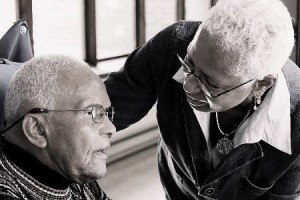
At a national conference last year on dementia my colleague Janet took the microphone during question time and asked why the pressure on GPs to push patients for early diagnosis when there was inadequate care and support for them and their families afterwards?
One of the speakers – a well known professional in the dementia world, banged the table with both hands and insisted that GPs were using this excuse as a pretext. There have to be more diagnoses, she insisted. And for months Health Minister Jeremy Hunt and other NHS spokesmen have been pressurising GPs to make early diagnoses so that patients could receive ‘tailored care and support.’ GPs’ practices have even been given diagnoses targets, and those that fail to reach them will be marked down by the inspecting body, the CQC.
Now a survey by the Royal College of GPs shows that this ‘tailored care and support’ simply doesn’t exist in many places. Social Services don’t even check on dementia patients to see if they are suffering from malnutrition.[i] GPs say that patients are forced to rely on family, friends and unpaid carers, and family caregivers often have to give up work to be on hand 24 hours a day.
Stephen Blakeburn, from Darlington, who cares for his mother, said he felt he had been failed by the system. [ii] ‘Since my mum was diagnosed with dementia, it has been a constant, all-consuming battle to get her the support she needs,’ he said. ‘After two care assessments which led to nothing, I’ve been left with no option but to drastically cut down my hours at work so I can take care of her. I love my mum dearly and want to do everything I can to support her but sometimes it gets too much and it is very overwhelming.’
The pressure on family caregivers can be devastating. Without ‘tailored care and support’ they can develop dementia caregiver burden, a syndrome with such devastating physical and emotional effects that it takes years off the lives of elderly carers and can even lead to them developing dementia themselves.
In response, the government has said dementia training had been given to 600,000 NHS and social care staff. Which is all right and proper, but it completely ignores the key point that there are not enough staff to provide care when it is needed. The dementia champions I’m in touch with speak of slow responses from Social Services and long delays with often nothing at the end of it. One champion was dismayed that a local dementia ‘signposting’ agency in her district had been given a grant of £50,000 but didn’t give any actual support.
In an earlier blog I asked why the government is pushing for more diagnoses when good aftercare is not available? Because the evidence is that the quality of care that a dementia sufferer receives is often the only real treatment available. Medication helps only one in three people, but good, person centred care can help hold the person together and slow the progression of the disease.
Prof Nigel Mathers, of the Royal College of GPs, warns that until good aftercare is available to all patients, regardless of where they live in the country, GPs will have to continue weighing up the advantages and disadvantages of early diagnosis.[iii]
He repeated GPs earlier arguments that previous evidence had shown that unless a patient’s wellbeing was improved by being given a diagnosis, one should not be forced upon them.
But it seems that the government still doesn’t get it. A Department of Health spokesman said: “We are already expanding access to named clinicians and dementia advisers to help patients and their families, and giving the option of personal budgets – and we want to see these things being offered across the NHS.”
Once diagnosed with dementia, it isn’t clinicians and dementia advisors people need, it’s support and care from people who understand dementia. Someone who can sit with a husband so his wife can take a break and do the shopping, or get her hair done. Or who will help with the patient’s toileting and showering. In Dementia, Frank & Linda’s Story, I wrote about the difference Frank’s carers made to their lives. It’s a true story following the experiences of a couple where the husband developed dementia. Linda’s rheumatoid arthritis increased hugely in those caring years, but the care and support she received from social services then was a life saver. It helped her to cope. It should be like that for every family coping with dementia.
Until good care is in place, it is immoral to pressurise GPs for more diagnoses. Government should stop trying to bend them to their political purposes.
[i] http://www.telegraph.co.uk/news/health/elder/11719300/Dementia-patients-being-failed-by-social-services-say-GPs.html
[ii] http://www.bbc.co.uk/news/health-33382976
[iii] IBID















